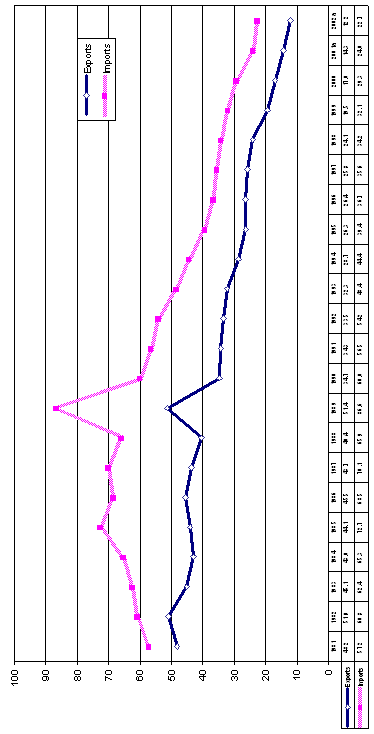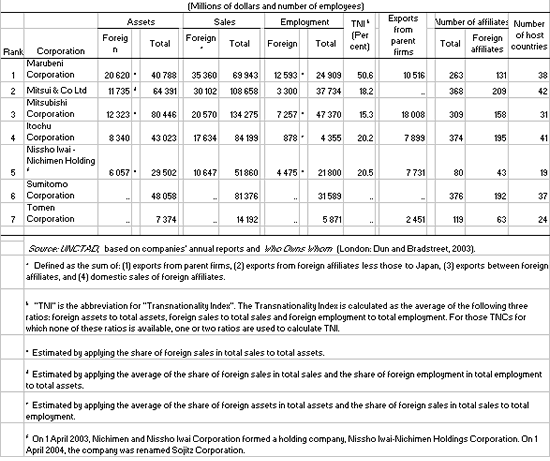The role of Japan´s sogo shosha ("general trading companies") in the country´s trade has declined substantially over the past 20 years, by some 40 percentage points (figure). At the same time, UNCTAD´s research shows that their foreign direct investment (FDI) activities have shifted towards services.
The sogo shosha have traditionally played a key role in Japan´s domestic and international trade(1). There are more than 11,000 trading companies in Japan, but only seven (2) (table) are classified as sogo shosha. They have contributed significantly to the development of Japan´s trade, particularly that of corporate groups (keiretsu). But they have also helped other Japanese firms, especially small and medium-sized enterprises, to penetrate international markets and integrate into global production chains.
Today, they have also started playing a key role in business promotion, research and information, market development, group management, risk management, logistics, finance and large-scale project organization.
The share of Japan´s imports and exports accounted for by the sogo shosha has declined gradually but significantly.
Looking more closely at this, UNCTAD finds that their share in imports has consistently remained above their share in exports. On the import side, the decline has been somewhat less, reflecting their role as suppliers of strategically important items, especially oil, gas, minerals and other primary products. On the export side, the decline is due largely to Japan´s manufacturing transnational corporations (TNCs) establishing their own marketing and sales networks overseas. In addition, while the keiretsu still maintain close relationships with the sogo shosha, the shosha´s business transactions outside these corporate groups are increasing.
Indeed, sogo shosha invest in many industries, but the industries they are targeting for investment are changing. Prior to 1980, 46% of sogo shosha´s foreign affiliates (1,338 firms) were in manufacturing (especially textiles and chemicals), ahead of commerce (31%). In terms of host economy, they were concentrated in Asia (46%) and the developed countries (37%).
According to a survey conducted in November 2002, the five largest sogo shosha own more than 1,500 foreign affiliates, operating, as in the past, in almost all industries and business activities. The geographical concentration has not changed much (41% in Asia and 41% in developed countries).
But manufacturing no longer constitutes the largest single sector of their FDI portfolio: foreign affiliates in services represent 69% (of which half is in commerce)(3). In commerce, other than their traditional overseas offices that are located virtually all over the world(4), UNCTAD has spotted an increase in trade of foreign brands of automobiles in developed countries (where sogo shosha operate as dealers in brand-name products) and in wholesale and manufacturing in China(5). Their involvement in information and communication technologies has risen as well. Among the sogo shosha´s other service affiliates, the majority are holding companies, or else they manage project investments. In addition to finance, insurance and transportation, they cover a wide range of activities - from industrial park development to aircraft leasing and database development.
In examining the 139 foreign affiliates established by the five largest sogo shosha in 2000-2002, the shift from manufacturing to services becomes clear: 82% were in services (40% in commerce and 42% in other services). Most of the new FDI was directed to developed countries (51%); within developing countries, the focus remains on Asia (30%).
ANNEX
Tables and figures
Figure. The share of the sogo shosha in Japan´s external trade, 1981-2002(Per cent)

Source: Japan Foreign Trade Council, Inc
Note: a Not including Sumitomo Corporation
Table. Trading for Japan: sogo shosha, ranked by foreign sales, 2003



